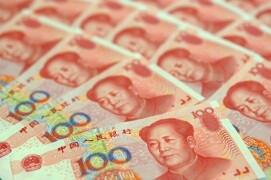The Chinese yuan is extending its losses to jumpstart the holiday-shortened trading week. The currency is falling against its rivals on Monday after the White House threatened to slap sanctions on China over the governmentâs proposed implementation of national security laws on Hong Kong that reportedly threaten its autonomy. The heightened tensions come as the worldâs two largest economies escalate their war of words over trade. Whether this is a new Cold War or another trade dispute, Beijing is facing a barrage of consequences at a time when it is trying to reboot the economy.
The National Peopleâs Congress, Chinaâs rubber-stamp parliament, will move forward with legislation that essentially bypasses Hong Kongâs legislature. President Xi Jinping and his administration have stated that the national security legislation is critical to protect the country following last yearâs wave of protests across Hong Kong.
NPC spokesman Zhang Yesu told reporters at a news conference that Hong Kong is inseparable from China, and that it is âhighly necessaryâ for the NPC to flex its constitutional power and ensure the safety of the public.
National security is the bedrock underpinning a country’s stability. Safeguarding national security serves the fundamental interests of all Chinese people, including our HK compatriots.
But regional critics say the law will likely give Beijing greater power to imprison opposition figures. In recent days, more than 200 political figures from the UK, Europe, North America, and Asia have condemned the legislation in a joint statement. The US was quick to rebuke the bill, titled âEstablishment and Improvement of the Legal System and Implementation Mechanism for the Safeguarding of National Security in the Hong Kong Special Administrative Region.â
White House National Security Advisor Robert OâBrien told NBC News over the weekend that the US government will likely impose sanctions on China if it moves ahead with what has been described as the âdeath knellâ for âthe one country, two systems.â He warned that if Beijing installed the measures, Hong Kong could inevitably lose its status as a major hub for global finance.
Itâs hard to see how Hong Kong could remain the Asian financial center that itâs become if China takes over. If all those things go away, Iâm not sure how the financial community can stay there. Theyâre not going to stay in Hong Kong to be dominated by the Peopleâs Republic of China, the communist party.
White House economic aide Kevin Hassett also confirmed economic penalties on China over its proposal.
China is facing additional criticism over its anti-dumping tariffs on Australia barley exports.
The possibility of another trade spat between the two economic superpowers seems to be growing. President Donald Trump has repeatedly threatened to sever ties with China. Despite fears over the phase-one trade deal being dismantled, administration economic advisor Larry Kudlow confirmed that it remains intact and that there is no need to renegotiate the agreement. It is unclear how China reacts after the president ordered the Federal Retirement Thrift Investment Board to divest billions from Chinese firms.
This week, April industrial profits and May purchasing managersâ index (PMI) readings will be released.
The USD/CNY currency pair rose 0.08% to 7.1363, from an opening of 7.1304, at 12:45 GMT on Monday. The EUR/CNY edged up 0.09% to 7.7746, from an opening of 7.7704.
If you have any questions, comments, or opinions regarding the Chinese Yuan, feel free to post them using the commentary form below.
